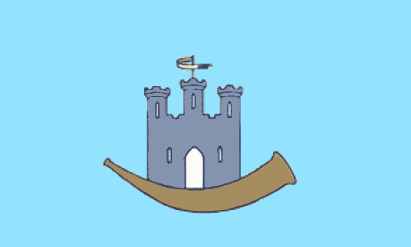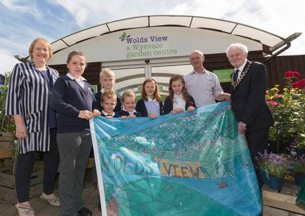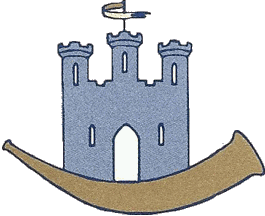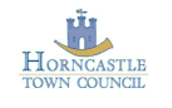 speculative image by Pete Loeser, 6 November 2020
speculative image by Pete Loeser, 6 November 2020Based on information received from Amanda Bushell, Town Clerk, Horncastle Town Council, 2 November 2020

FOTW beschäftigt sich mit der Wissenschaft der Vexillologie (Flaggenkunde).
Alle auf dieser Website dargebotenen Abbildungen dienen ausschließlich der Informationsvermittlung im Sinne der Flaggenkunde.
Wir distanziert uns ausdrücklich von allen hierauf dargestellten Symbolen verfassungsfeindlicher Organisationen.
Last modified: 2021-06-12 by rob raeside
Keywords: horncastle | lincolnshire |
Links: FOTW homepage |
search |
disclaimer and copyright |
write us |
mirrors
 speculative image by Pete Loeser, 6 November 2020
speculative image by Pete Loeser, 6 November 2020
Based on information received from Amanda Bushell, Town Clerk, Horncastle Town Council, 2 November 2020
On this page:
The following information is provided on the Horncastle Town Council Website:
The book A History of Horncastle by J. Conway Walter, is available free from the Gutenberg Project. You can download the book for free here.
I add some additional information I discovered in an old 2013 Lincolnshire Tourist Guide during my research:
"Horncastle News" announced on 15 October 2008: "Horncastle Town Council would like the town to have its own flag and will be asking the town's young people to come up with some exciting designs. Over the next few weeks the council will be contacting all Horncastle schools and inviting pupils to take part in a competition to find the best design for the flag. The competition will be for three age groups with prizes for the best three designs from each age group. The top four designs from each group chosen by Horncastle Town Council will be displayed in the library during December. This will give the public a chance to choose their favourite design and determine the overall winner. Entry forms with more details and design parameters will be distributed later this month."
More on the town on Wikipedia: Wikipedia: Horncastle.
Ivan Sache, 14 October 2008
A bit of a 12 year "no progress" report. As of this date it remains unclear if any flag contest was held, or any flag for the Horncastle Town Council was considered or adopted. There is still no known flag for Horncastle.
Pete Loeser, 21 October 2020
 image provided by Amanda Bushell, 6 November 2020
image provided by Amanda Bushell, 6 November 2020
I'm afraid I don't know anything about a competition to design a flag. I have only worked for the Council since 2011, so this was before my time. The only flags that I have seen have the town council logo on them, but this was designed much longer than 12 years ago.
Amanda Bushell, Town Clerk, Horncastle Town Council, 2 November 2020
My e-mail to the Horncastle News has never received a response. I've also contacted their historical society to see if they have anything, again no response. Amanda Bushell, the current Horncastle Town Council Clerk, sent me the picture of the Horncastle Town Council logo she says they are now using. She also recalled it was placed on a light blue background on the flags she has seen. Hopefully more details will be provided in the future.
Pete Loeser, 2 November 2020
 image located by Pete Loeser, 10 June 2021
image located by Pete Loeser, 10 June 2021
Apparently the local Wolds View (Wyevale Garden Centre) in Horncastle announced the winner on 26 July 2016 of a flag design contest for their business held in the local primary school and this may have been what started this whole thing about a flag for Horncastle. This awards photo appeared in The Lincolnshire World.
Source: Lincolnshire World: Chloes Winning Flag.
Pete Loeser, 10 June 2021
 Facebook
Facebook
 Website
Website
images located by Pete Loeser, 10 June 2021
I found these two logos on the Horncastle Town Council Facebook page and on their website page. Still have nothing about a matching flag.
Pete Loeser, 10 June 2021
![[Horncastle Rural District Council Coat Of Arms]](../images/g/gb-e-lin-hrdc.gif) image located by Pete Loeser, 21 October 2020
image located by Pete Loeser, 21 October 2020
Horncastle was a rural district between 1894 and 1974 in the Parts of Lindsey, a subsection of Lincolnshire today. It was formed under the Local Government Act of 1894 from the earlier Horncastle Rural Sanitary District. It entirely surrounded the town of Horncastle, which was then an urban district town city. The rural district was abolished under the Local Government Act of 1972 and merged with other districts to form the district of East Lindsey. However in 1956 Horncastle was granted its own coat of arms.
Some of the symbols in the arms refer to the following: The double-towered castle refers to Tattershall Castle, one of the District's most famous landmarks. The two bulls' heads identify the district's cattle raising industry. The golden mitre refers to the area's monastic history and to the fact that Archbishop Stephen Langton, who presented Magna Carta for King John's signature in 1215 was born in the Horncastle district.
![[Horncastle Town FC #3]](../images/g/gb-e-lin-htfc3.gif)
![[Horncastle Town FC #2]](../images/g/gb-e-lin-htfc2.gif)
images by Pete Loeser, 21 October 2020
The Horncastle Town Football Club is an amateur football club and has a proud history dating back to when the club was founded in 1873. They previously played in the Boston & District League Premier division, but now "The Wongers" 1st team competes in the Lincolnshire Football League and have done so for the past 18 seasons. Their home ground is The Wong and the team colors are red and white.
Like most towns with English football clubs, more attention to flags representing the community exist in their sporting world than their community in general. The Horncastle Town Football Club fan flags presents an example.
My drawings based on this photo and this photo.
Pete Loeser, 21 October 2020
![[Horncastle Town FC #1]](../images/g/gb-e-lin-htfc1.gif)
![[Horncastle Town FC Logo]](../images/g/gb-e-lin-htfc-lo.gif)
images by Pete Loeser, 21 October 2020
Hosted by: Fanshop-Online.de und Handy-Shop.de
Tipp: Apple iPhone 12 im Shop